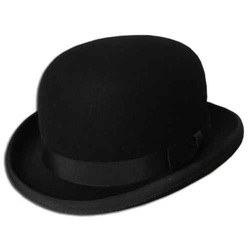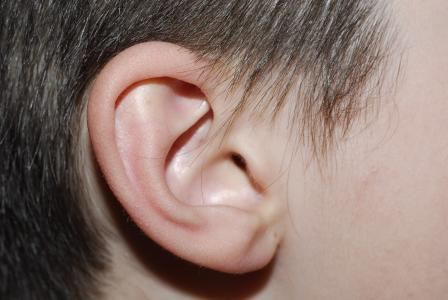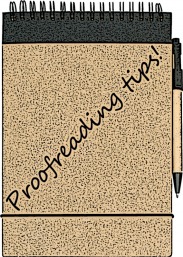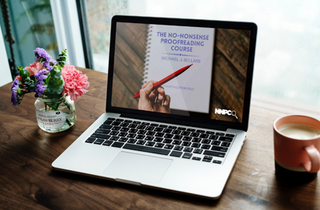|
Homophones (words with the same sound but a different spelling and meaning) can be the proofreader's worst enemy. Here's a comprehensive list of homophones. I can't claim the credit for compiling the list, by the way, as it's pretty much all over the internet. To the person who put all the work in, I offer my gratitude.
Here's the list (print it out and keep it close at hand): 1. accessary, accessory 2. ad, add 3. ail, ale 4. air, heir 5. aisle, I'll, isle 6. all, awl 7. allowed, aloud 8. alms, arms 9. altar, alter 10. arc, ark 11. aren't, aunt 12. ate, eight 13. auger, augur 14. auk, orc 15. aural, oral 16. away, aweigh 17. awe, oar, or, ore 18. axel, axle 19. aye, eye, I 20. bail, bale 21. bait, bate 22. baize, bays 23. bald, bawled 24. ball, bawl 25. band, banned 26. bard, barred 27. bare, bear 28. bark, barque 29. baron, barren 30. base, bass 31. bay, bey 32. bazaar, bizarre 33. be, bee 34. beach, beech 35. bean, been 36. beat, beet 37. beau, bow 38. beer, bier 39. bel, bell, belle 40. berry, bury 41. berth, birth 42. bight, bite, byte 43. billed, build 44. bitten, bittern 45. blew, blue 46. bloc, block 47. boar, bore 48. board, bored 49. boarder, border 50. bold, bowled 51. boos, booze 52. born, borne 53. bough, bow 54. boy, buoy 55. brae, bray 56. braid, brayed 57. braise, brays, braze 58. brake, break 59. bread, bred 60. brews, bruise 61. bridal, bridle 62. broach, brooch 63. bur, burr 64. but, butt 65. buy, by, bye 66. buyer, byre 67. calendar, calender 68. call, caul 69. canvas, canvass 70. cast, caste 71. caster, castor 72. caught, court 73. caw, core, corps 74. cede, seed 75. ceiling, sealing 76. cell, sell 77. censer, censor, sensor 78. cent, scent, sent 79. cereal, serial 80. cheap, cheep 81. check, cheque 82. choir, quire 83. chord, cord 84. cite, sight, site 85. clack, claque 86. clew, clue 87. climb, clime 88. close, cloze 89. coal, kohl 90. coarse, course 91. coign, coin 92. colonel, kernel 93. complacent, complaisant 94. complement, compliment 95. coo, coup 96. cops, copse 97. council, counsel 98. cousin, cozen 99. creak, creek 100. crews, cruise 101. cue, kyu, queue 102. curb, kerb 103. currant, current 104. cymbol, symbol 105. dam, damn 106. days, daze 107. dear, deer 108. descent, dissent 109. desert, dessert 110. deviser, divisor 111. dew, due 112. die, dye 113. discreet, discrete 114. doe, doh, dough 115. done, dun 116. douse, dowse 117. draft, draught 118. dual, duel 119. earn, urn 120. eery, eyrie 121. ewe, yew, you 122. faint, feint 123. fah, far 124. fair, fare 125. farther, father 126. fate, fête 127. faun, fawn 128. fay, fey 129. faze, phase 130. feat, feet 131. ferrule, ferule 132. few, phew 133. fie, phi 134. file, phial 135. find, fined 136. fir, fur 137. fizz, phiz 138. flair, flare 139. flaw, floor 140. flea, flee 141. flex, flecks 142. flew, flu, flue 143. floe, flow 144. flour, flower 145. foaled, fold 146. for, fore, four 147. foreword, forward 148. fort, fought 149. forth, fourth 150. foul, fowl 151. franc, frank 152. freeze, frieze 153. friar, fryer 154. furs, furze 155. gait, gate 156. galipot, gallipot 157. gallop, galop 158. gamble, gambol 159. gays, gaze 160. genes, jeans 161. gild, guild 162. gilt, guilt 163. giro, gyro 164. gnaw, nor 165. gneiss, nice 166. gorilla, guerilla 167. grate, great 168. greave, grieve 169. greys, graze 170. grisly, grizzly 171. groan, grown 172. guessed, guest 173. hail, hale 174. hair, hare 175. hall, haul 176. hangar, hanger 177. hart, heart 178. haw, hoar, whore 179. hay, hey 180. heal, heel, he'll 181. hear, here 182. heard, herd 183. he'd, heed 184. heroin, heroine 185. hew, hue 186. hi, high 187. higher, hire 188. him, hymn 189. ho, hoe 190. hoard, horde 191. hoarse, horse 192. holey, holy, wholly 193. hour, our 194. idle, idol 195. in, inn 196. indict, indite 197. it's, its 198. jewel, joule 199. key, quay 200. knave, nave 201. knead, need 202. knew, new 203. knight, night 204. knit, nit 205. knob, nob 206. knock, nock 207. knot, not 208. know, no 209. knows, nose 210. laager, lager 211. lac, lack 212. lade, laid 213. lain, lane 214. lam, lamb 215. laps, lapse 216. larva, lava 217. lase, laze 218. law, lore 219. lay, ley 220. lea, lee 221. leach, leech 222. lead, led 223. leak, leek 224. lean, lien 225. lessen, lesson 226. levee, levy 227. liar, lyre 228. licence, license 229. licker, liquor 230. lie, lye 231. lieu, loo 232. links, lynx 233. lo, low 234. load, lode 235. loan, lone 236. locks, lox 237. loop, loupe 238. loot, lute 239. made, maid 240. mail, male 241. main, mane 242. maize, maze 243. mall, maul 244. manna, manner 245. mantel, mantle 246. mare, mayor 247. mark, marque 248. marshal, martial 249. marten, martin 250. mask, masque 251. maw, more 252. me, mi 253. mean, mien 254. meat, meet, mete 255. medal, meddle 256. metal, mettle 257. meter, metre 258. might, mite 259. miner, minor, mynah 260. mind, mined 261. missed, mist 262. moat, mote 263. mode, mowed 264. moor, more 265. moose, mousse 266. morning, mourning 267. muscle, mussel 268. naval, navel 269. nay, neigh 270. nigh, nye 271. none, nun 272. od, odd 273. ode, owed 274. oh, owe 275. one, won 276. packed, pact 277. packs, pax 278. pail, pale 279. pain, pane 280. pair, pare, pear 281. palate, palette, pallet 282. pascal, paschal 283. paten, patten, pattern 284. pause, paws, pores, pours 285. pawn, porn 286. pea, pee 287. peace, piece 288. peak, peek, peke, pique 289. peal, peel 290. pearl, purl 291. pedal, peddle 292. peer, pier 293. pi, pie 294. pica, pika 295. place, plaice 296. plain, plane 297. pleas, please 298. plum, plumb 299. pole, poll 300. poof, pouffe 301. practice, practise 302. praise, prays, preys 303. principal, principle 304. profit, prophet 305. quarts, quartz 306. quean, queen 307. rain, reign, rein 308. raise, rays, raze 309. rap, wrap 310. raw, roar 311. read, reed 312. read, red 313. real, reel 314. reek, wreak 315. rest, wrest 316. retch, wretch 317. review, revue 318. rheum, room 319. right, rite, wright, write 320. ring, wring 321. road, rode 322. roe, row 323. role, roll 324. roo, roux, rue 325. rood, rude 326. root, route 327. rose, rows 328. rota, rotor 329. rote, wrote 330. rough, ruff 331. rouse, rows 332. rung, wrung 333. rye, wry 334. saver, savour 335. spade, spayed 336. sale, sail 337. sane, seine 338. satire, satyr 339. sauce, source 340. saw, soar, sore 341. scene, seen 342. scull, skull 343. sea, see 344. seam, seem 345. sear, seer, sere 346. seas, sees, seize 347. sew, so, sow 348. shake, sheikh 349. shear, sheer 350. shoe, shoo 351. sic, sick 352. side, sighed 353. sign, sine 354. sink, synch 355. slay, sleigh 356. sloe, slow 357. sole, soul 358. some, sum 359. son, sun 360. sort, sought 361. spa, spar 362. staid, stayed 363. stair, stare 364. stake, steak 365. stalk, stork 366. stationary, stationery 367. steal, steel 368. stile, style 369. storey, story 370. straight, strait 371. sweet, suite 372. swat, swot 373. tacks, tax 374. tale, tail 375. talk, torque 376. tare, tear 377. taught, taut, tort 378. te, tea, tee 379. team, teem 380. tear, tier 381. teas, tease 382. terce, terse 383. tern, turn 384. there, their, they're 385. threw, through 386. throes, throws 387. throne, thrown 388. thyme, time 389. tic, tick 390. tide, tied 391. tire, tyre 392. to, too, two 393. toad, toed, towed 394. told, tolled 395. tole, toll 396. ton, tun 397. tor, tore 398. tough, tuff 399. troop, troupe 400. tuba, tuber 401. vain, vane, vein 402. vale, veil 403. vial, vile 404. wail, wale, whale 405. wain, wane 406. waist, waste 407. wait, weight 408. waive, wave 409. wall, waul 410. war, wore 411. ware, wear, where 412. warn, worn 413. wart, wort 414. watt, what 415. wax, whacks 416. way, weigh, whey 417. we, wee, whee 418. weak, week 419. we'd, weed 420. weal, we'll, wheel 421. wean, ween 422. weather, whether 423. weaver, weever 424. weir, we're 425. were, whirr 426. wet, whet 427. wheald, wheeled 428. which, witch 429. whig, wig 430. while, wile 431. whine, wine 432. whirl, whorl 433. whirled, world 434. whit, wit 435. white, wight 436. who's, whose 437. woe, whoa 438. wood, would 439. yaw, yore, your, you're 440. yoke, yolk 441. you'll, yule Thanks, again, to the original creator.
0 Comments
 I’ve just been looking at my Google Analytics and it has revealed some interesting data about the international nature of The No-Nonsense Proofreading Course. For those of you unfamiliar with Google Analytics, this is a very important tool if you’re looking to secure work via a website. It tells you how many visits you’ve had, how they arrived at your site (which phrases they keyed into Google, for example) and how long those visitors stayed on any given page. From all this information (and much more), you can fine tune your website to improve the visitor experience, create a more compelling offer for your freelance proofreading services and, ultimately, secure more proofreading assignments. I use it all the time for The No-Nonsense Proofreading Course website and it has become invaluable. Anyway, back to that ‘interesting data’. My intention with The No-Nonsense Proofreading Course was always to value-engineer it so that there was no unnecessary expense. For that reason, I did away with all the grammar instruction you tend to find bundled in with other proofreading courses. Page for page, this grammar instruction is ridiculously expensive when compared to the price of Fowler’s Modern English or the American Heritage Book of English Usage, particularly if you pick up a copy at a second hand bookshop or on eBay. This has proved to be a very popular move if sales are anything to go by. It has also produced a commercially advantageous side-effect. Because The No-Nonsense Proofreading Course isn’t anchored to any particular variant of English grammar, the eBook sells internationally. When I look at my Google Analytics for ‘Country/Territory’ over the last 12 months, I can see that people have bought the eBook in the UK, Ireland, the USA, Canada, Australia, New Zealand, South Africa, Portugal, Fiji, Hungary, Qatar, Sweden, Kenya, the United Arab Emirates, Malta, Germany, France, Spain and Singapore. Obviously, it would be silly to say that The No-Nonsense Proofreading Course was an ‘International Proofreading Course’, but I don’t think it would be too unreasonable to describe it as a proofreading course that caters to the English-speaking world, irrespective of accent or dialect. The robust proofreading methodology at the heart of my eBook isn’t tied to any particular brand of English. Okay, when I said ‘interesting data’, I should probably have said, ‘very slightly interesting data’. 2/15/2011 So, you want to be a proofreader but your grammar’s a little rusty. Is it all over?Read NowYou have a good eye for detail. You’re thorough. You’re patient. You have what it takes to be a proofreader.
Except... your grammar is a little bit ropey. Don’t worry. Those other traits – the eye for detail, the thoroughness, the patience – are innate. Those things are incredibly difficult to learn. Grammar? That’s something that can be learned. Now, depending on whereabouts you are on the ropey-o-meter will decide what kind of assistance you’re going to need. If you just need to tighten up your understanding of dangling modifiers, split infinitives and the like, then you probably just need to study a copy of Fowlers Modern English Usage. If, however, you’re in need of a bit more of an overhaul, you’re probably going to need something a little more intensive. English Grammar Revolution offers a pretty good place to start. The course uses videos rather than books to explain the eight parts of speech and to teach you basic sentence diagramming. And then there are downloadable PDF worksheets for practicing and fine-tuning your understanding. If you’ve got the eye, patience and determination to become a proofreader but you’re worried that your understanding of grammar might let you down, English Grammar Revolution is well worth a look, particularly as it comes with a 100% money-back guarantee. Click on the link below for more information. What have you got to lose? On the sales page of this website and in the introduction to The No-Nonsense Proofreading Course itself, I advise my readers to be wary of any proofreading course which includes modules or chapters on the subject of grammar and proper English usage. The reason I counsel caution with regard to this is simple: why pay for something which is available elsewhere relatively cheaply (Fowler’s Modern English Usage) or completely free (The Plain English Campaign website)? It’s what the kids call a ‘no-brainer’. Apparently.
Well, I’ve just stumbled upon another fantastic free resource, offering comprehensive instruction on the subject of grammar and English usage. It’s an online training course provider called Alison and you’ll find it here. There are a whole host of individual free courses available, from IT and mathematics to chemistry and economics. The course you’re likely to be interested in is called ‘English Grammar Rules’ and it is described thus: “This free online course offers a comprehensive revision of English grammar. It is designed for those already fluent in English, but who want to improve their writing. It covers punctuation and grammar, from commas and colons to adverbs and prepositions. By completing this course, you will see a marked improvement in your written English. Each section breaks down the rules into easily assimilated explanations. There is a section on spelling. This course is ideal for anyone looking to improve their written and indeed spoken English.” All you need to do is sign up (which is free) and go here. Then, one push of a button and you’re off. I really can’t recommend this highly enough for those of you who feel their grammar skills may need a little bit of an overhaul before they attempt to embark on a proofreading career. Best of luck. In my experience, proof readers tend to be rather calm individuals, going about their work in an unruffled, dignified manner. Proof readers are rarely confrontational in temperament, because proofreading by its very nature requires a serene and reflective approach. So, it was rare for me, as an Operations Manager supervising, amongst other people, proof readers, to have to intervene in any kind of serious dispute.
Except when it came to hyphens. To a proof reader, hyphens are like a red rag to a bull. There appear to be two distinct camps. On the one hand you’ve got your proof readers who can’t get enough of hyphens, proof readers who would happily mark-up an otherwise clean proof with an overabundance of little red dashes. And, on the other hand, you’ve got your anti-hyphen proof readers (or should that be ‘antihyphen’ or ‘anti hyphen’?). These guys would gladly see the hyphen put it into storage, to be taken out and dusted off on those rare occasions where context alone is insufficient to infer meaning. My personal leanings are toward the second camp. There was nothing more infuriating than seeing a proof limp toward the finish line simply because of a few hyphens (particularly when it’s holding up an entire forme and the head of the print department is having a monumental hissy fit). Given my personal feelings on this matter, it’s probably best if I hand over to an independent authority: the Plain English Campaign. The following is from their excellent website: The main use of a hyphen is to join two or more words together. Sometimes a word needs a hyphen for it to be spelt correctly. For example: • one-off • part-time • face-to-face In some situations there are no hard and fast rules and the use of hyphens is a matter of personal preference. However, there are some guidelines on when you should use them. In compound adjectives (single adjectives formed from two or more words) that appear before a noun For example: • An up-to-date guide is a guide that is up to date. • Income-based Jobseeker’s Allowance is a benefit that is based on your income. • An energy-efficient fridge is one that is energy efficient. These hyphens are often necessary to avoid confusion. For example: • A blue-collared shirt is a shirt with a blue collar, while a blue collared shirt could be a blue shirt that has a collar. • A French-dictionary salesman is a man who sells French dictionaries, while a French dictionary salesman could be a Frenchman who sells dictionaries. • A red-wine bottle is a bottle for red wine, while a red wine bottle could be a wine bottle that is red. To distinguish one word from a similar one For example: • re-sort, not resort • co-op, not coop • re-form, not reform With prefixes Some words formed with a prefix are always hyphenated. For example: • self-employed • pro-family • anti-aircraft With some prefixes, a hyphen is not necessary but is preferable to help with pronunciation, avoid a double vowel, or stop a word looking odd. For example: • co-ordinate • re-enter • de-ice When numbers between 21 and 99 are written out in full For example: • twenty-one • ninety-nine • one hundred and thirty-four (Note that only ‘thirty-four’ is hyphenated.) Remember, us proof readers are a relatively small group. We need to stick together. So, let’s not fight. |
Details
Testimonials
“I am one of those many fools who paid a huge amount of money for a useless course. This book... has opened so many doors for me. I now look on Mike as my mentor as I embark on a career. Thank you Mike.” Emma Steel, Proofreader and International Structural Editor. “ I thoroughly enjoyed the course and am so glad that I decided to take it... the whole experience was invaluable. My proofreading service is now well established and your course played no small part in getting it off the ground.” Hache L. Jones, Proofreader. “I'd just like to thank you first of all for writing such a great, straight forward eBook, and then going above and beyond what I would even expect as a customer by providing us, completely free of charge, updated versions months later!” Rachel Gee, Trainee Proofreader. “What can I say? Worth every penny and then some! God Bless! This a fabulous course.” Teresa Richardson, Proofreader. “As someone who has effectively been proofreading for thirty years, I found Mike’s No-Nonsense Proofreading Course an invaluable introduction and a very useful practical guide to many aspects of this discipline. I can wholeheartedly recommend it as the ideal starting point, and much more besides.” Jeremy Meehan, Proofreader. Blog AuthorMy name's Mike Sellars and I'm an experienced proofreader and the author of The No-Nonsense Proofreading Course. Click here to find out more about me. The No-Nonsense Proofreading CourseA Fraction of the Cost of Other Proofreading Courses NOTE: Stock is currently limited to 10 per day, so we can continue to deliver exceptional after-sales service, answer queries and provide open-door support. Credit card and PayPal payments accepted. “As someone who has been proofreading for 30 years, I found Mike’s course an invaluable introduction and a very useful practical guide to many aspects of the discipline. I can wholeheartedly recommend it.” Jeremy Meehan, Proofreader. Still want to find out more? Click here. Proofreading Categories
All
Proofreading Archives
July 2024
|



 RSS Feed
RSS Feed
